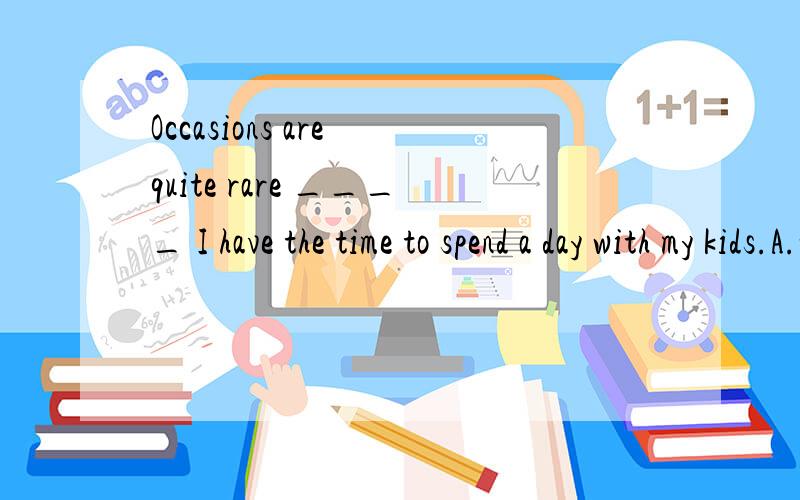Occasions are quite rare ____ I have the time to spend a day with my kids.A.whoB.whichC.whyD.when
来源:学生作业帮助网 编辑:作业帮 时间:2024/11/26 06:27:27

Occasions are quite rare ____ I have the time to spend a day with my kids.A.whoB.whichC.whyD.when
Occasions are quite rare ____ I have the time to spend a day with my kids.
A.who
B.which
C.why
D.when
Occasions are quite rare ____ I have the time to spend a day with my kids.A.whoB.whichC.whyD.when
选D
我有一天时间与我的孩子在一起的时机是非常少的
首先可以排除A和C,明显不符合语境
occasion 有场合也有时机的意思,如果是场合,则用where或者on which修饰,如果是时机,则用when或者in which 修饰.这里用场合不合适,因为1which前没有介词2不符合语境.只能使用when.
这个句子可以调整一下为
Occasions when I have the time to spend a day with my kids are quite rare.
Occasions为先行词,when为关系副词,引导定语从句,并在定语从句中做时间状语.
B 定语从句(先行词occasions, 关系代词which)
定语从句一般紧接先行词,但是有时也可以和先行词分离,如:
A new teacher will come tomorrow who will teach you German.
There was an old man there who smoked a long pipe.
这句就是定语从句与先行词分离的例子,碰到这种情况,可以把定语从句移到先行词occasions后面...
全部展开
定语从句一般紧接先行词,但是有时也可以和先行词分离,如:
A new teacher will come tomorrow who will teach you German.
There was an old man there who smoked a long pipe.
这句就是定语从句与先行词分离的例子,碰到这种情况,可以把定语从句移到先行词occasions后面去,不难看出,我们需要的是一个关系副词,C是关系副词,但是先行词只能用reason,这道题目只能选择D,表示“我有时间与我的孩子在一起度过一天的机会是非常少的。”这句话是父母的心声,因为双职工的家庭非常多,父母常常无暇照顾孩子。希望我能帮助你解疑释惑。
收起